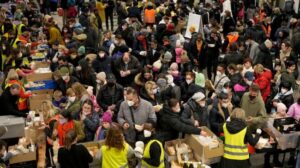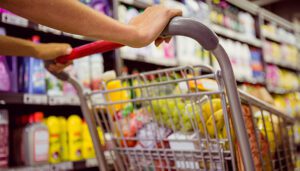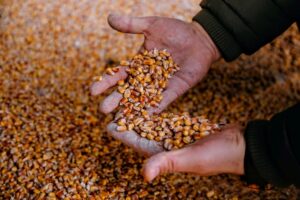
Ukraine’s international reserves currently stand at $27.4 billion, representatives of the National Bank of Ukraine (NBU) said at a meeting with the European Business Association (EBA) and the American Chamber of Commerce on April 15.
“The country’s foreign exchange reserves amount to $27.4 billion, which became possible thanks to the support of international partners – the IMF, the EU (which provided the first tranche of 600 million euros), the EBRD, etc. The total amount of assistance received from international partners is $3.8 billion “, – is noted in the release of the EBA following the meeting.
Earlier, the NBU reported that Ukraine’s international reserves as of April 1, 2022 amounted to $28.1 billion, which is 2% more than at the beginning of March ($27.5 billion).
Representatives of the National Bank at the meeting also pointed out that in general, since the beginning of the war, the volume of net sales of foreign currency by the NBU amounted to $ 2 billion, and recently there has been a tendency for currency supply to prevail over demand for it.
As one of the meeting participants specified to the Interfax-Ukraine agency, Deputy Head of the National Bank Yuriy Heletiy said that the supply of foreign currency in April began to exceed the demand for it in the non-cash market from legal entities. According to him, the growth was caused by the gradual resumption of the work of enterprises of the mining and metallurgical complex, companies from the IT services sector.
Representatives of the National Bank also indicated that they do not yet see the need to introduce a mandatory sale of foreign currency.
Speaking about possible future steps to remove currency restrictions, the regulator admitted the possibility of certain relaxations in areas related to trade finance: settlements on export-import guarantees, letters of credit, while the return of other foreign loans will remain prohibited.

Federal Minister of Digital Technologies and Transport of Germany Volker Wissing says that the flow of refugees from Ukraine has significantly decreased and stressed that the German state does not intend to impose any restrictions on the admission of Ukrainian refugees.
“The number of refugees traveling to Germany by train has dropped significantly from its peak at the beginning of the war, from around 8,200 to the current around 2,500 people a day. However, we maintain logistical and transport structures because we cannot predict the course of the war at any moment may face an increase in the number of refugees. We must expect further escalation and be prepared. Those in need in Ukraine should be able to find asylum in Germany,” Wissing said in an interview with the German Editorial Network (RedaktionsNetzwerk Deutschland, RND).
When asked if there is an upper limit for accepting refugees from Ukraine, the minister replied: “This question does not arise. Germany cannot and will not reject refugees from Ukraine.”
He also noted that Germany is working on accepting Ukrainian refugees who were previously settled in the EU countries neighboring Ukraine, and is also working to ensure that other EU countries are involved in this, recalling that a number of Polish cities have reached the limit of their capacity to accommodate Ukrainians.
“We quickly became convinced that people traveling from Ukraine could be transported from Poland to Germany. There are distribution centers in Hannover, Cottbus and Berlin…. If there is a threat of congestion in neighboring Ukrainian countries, we must again campaign for their distribution throughout the EU .I am in constant contact with my European colleagues,” Wissing said.
Asked about his attitude to the energy embargo against Russia, the minister noted that Germany “very quickly launched a comprehensive package of sanctions together with its European partner countries and the United States, but the impact on our society must also be taken into account when deciding on sanctions.” “Nothing would be more beneficial to Mr. Putin than if we took action that would lead to a quarrel and ultimately divide our society,” he stressed.
“Germany is very aware of its role and acts responsibly. We avoid acting alone and act in close coordination with our European partners,” Wissing concluded.

French Ambassador Etienne de Ponsin has returned to the Ukrainian capital, Tudor Alexis, Consul General of France in Toronto, reports.
“French Ambassador to Ukraine Etienne de Poncins raised the French flag to reopen our embassy in Kyiv and says: “Kyiv was not conquered, Ukraine withstood the aggression and we want to be as close as possible to the authorities to show support and express solidarity” , he tweeted Friday night.
As the French Foreign Ministry reported on April 14, the embassy will soon return to its permanent base in Kyiv.

The Cabinet of Ministers has approved the attraction of concessional funds from the Japanese government in the amount of 13 billion yen (about $103.75 million at the current exchange rate), Prime Minister Denys Shmygal announced.
“Today, at a government meeting, we finalized agreements with the government of Japan to raise aid in the amount of 13 billion yen,” Shmygal said in his address on Friday evening.
According to him, these preferential funds will be used to finance the priority needs of the country and the Ukrainian people.

Ukraine has been provided with basic food products for several years, as well as raw materials for the production of animal feed, so no food problems are expected in the country in the near future, Minister of Agrarian Policy and Food of Ukraine Mykola Solsky told the Ekonomicheskaya Pravda publication.
“We have stocks of basic products for several years. Vegetable oil – at least for 10 years. Separately, we need to add, since we have a lot of grains, and some of them are animal feed, we definitely have meat and dairy products. And special There is no reason to worry here,” he said.
According to him, Ukraine annually consumes 5-7 million tons of grain crops, while 20 million tons of grain have already been placed in the country’s granaries since last season and 30 million tons of this season’s harvest are expected. Taking into account the elevator capacities available in the country, the main problem will be the export of crops to foreign markets in the conditions of the blockade of Ukrainian seaports by Russian warships, the head of the Ministry of Agrarian Policy stressed.
“We don’t see any problems with food in Ukraine now. They exist where it cannot be delivered, but this is different. Everyone sees that goods, their range in stores has decreased, but it exists. I have a feeling that the situation has begun to gradually recover “, – summed up Solsky.
As reported, before the Russian military invasion, Ukraine monthly exported up to 5 million tons of agricultural products through the ports of Odessa and Nikolaev, but now, due to their naval blockade by Russia, the country can transport about 500 thousand tons of grain monthly. This leads to a monthly shortfall of about $1.5 billion in export earnings.
Earlier, on April 13, UN Secretary General António Guterres said that the war in Ukraine could doom more than 1/5 of humanity to poverty, want and hunger unprecedented for decades.

On April 11, the Prometey group of companies resumed the work of its Kiev office, while its main office in Nikolaev has not stopped working since the beginning of Russia’s invasion of Ukraine, the grain trader’s website reported on Friday.
The owner of the holding, Rafael Goroyan, noted in a message that the Kyiv staff of Prometey is returning to the production process, since now the city is calm and safe.
The grain trader clarified that he still does not have access to 3 thousand hectares in the Snigirevsky district of the Nikolaev region due to the occupation of part of the region by Russian troops, while the total land bank of Prometey is 20 thousand hectares.
In the territory controlled by Ukraine, out of 17 thousand hectares, 10 thousand hectares have already been sown with winter crops, sunflower is being planted in the remaining areas.
“Prometey” recalled that in mid-March, Russian invaders attacked the offices of the production companies “VK Prometey” (Peski village) and Agro Capital Center LLC (AKC, Dobraya Krinitsa village, both – Mykolaiv region), where they destroyed / x and office equipment, documentation, weighing and monitoring systems. Despite the attack, the company has already reopened branches.
GC “Prometey” provides services for the storage, processing and logistics of grain and leguminous crops on the basis of 29 elevators in Mykolaiv, Kirovograd, Kiev, Khmelnytsky, Zaporozhye, Sumy, Odessa, Kherson and Dnepropetrovsk regions.
At the end of 2021, Prometey Group plans to receive $45 million in EBITDA, while in 2020 this figure reached $32.6 million, and in 2019 – $30.5 million.
The founder and owner of Prometey Group of Companies is Rafael Goroyan.